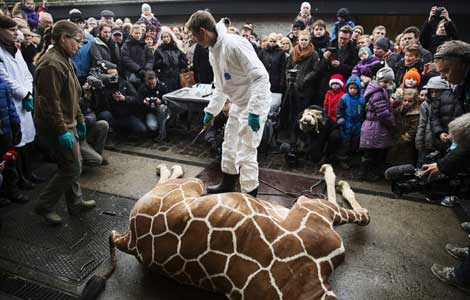Test designed to predict corrupt tendencies
Updated: 2014-02-11 01:21
By CANG WEI and SONG WENWEI in Nanjing (China Daily)
|
||||||||
Civil servants in Jiangsu province will have to answer a series of sensitive questions, some delving into their private lives, in a bid to root out those that might fall prey to corruption.
The test put forward by the procuratorate in Nanjing’s Gulou district contains 34 questions, including how many times sex-related services have been offered and if they wish to have extramarital sex or an affair.
The higher the score, the more prone the person is to corruption, according to authorities who established the test.
Mei Kun, deputy chief procurator of the procuratorate, said the test makes those who sit it more aware of the possible pitfalls that face them and can act as a warning.
The test scores are confidential, Mei said.
"The answers will only be known by those who set the test, but the test can act as a kind of self education."
The test, made by the procuratorate and the discipline inspection commission of Gulou district and the crime prevention and control research institute under Nanjing University, has been distributed to more than 2,000 local civil servants since January.
According to Mei, a corruption prevention center was established in Nanjing in 2000, but it relied on traditional methods, such as group studies and analyzing cases of corruption.
According to the commission for discipline inspection in Jiangsu, 10,357 corrupt officials were punished by disciplinary authorities in 2013.
More than 180,000 officials were punished nationwide last year, according to statistics from the Central Commission for Discipline Inspection.
The test was the result of extensive research carried out by Di Xiaohua, director of the research institute.
Di visited 47 corrupt officials in five prisons and analyzed a questionnaire completed by more than 200 people found guilty of corruption.
"The test is better than regular anti-corruption alerts because it provides a chance for high-ranking officials, who often face temptation, to reflect," Di said.
However, the test has faced criticism, especially from netizens.
"Almost all civil servants can pass psychological tests if they want," said Luo Qi, a Nanjing resident.
"To become a civil servant, one at least needs to acquire a bachelor’s degree. Passing tests is a piece of cake."
In 2013, more than 1.1 million people in China participated in the civil service exam, with one in 53 being offered positions.
"A detailed and strict supervision system is more effective than these tests," Luo said.
Mei admitted that there are areas for improvement.
"Education is vitally important because human beings have frailties," Mei said.
"Self education, the discipline inspection system and supervision by the public are all vital in fighting corruption."
Contact the writers at cangwei@chinadaily.com.cn and songwenwei@chinadaily.com.cn
Most Viewed
Editor's Picks

|

|

|

|

|

|
Today's Top News
Kerry seeks to 'rule out' possibility of conflict
Joint operation ensnares poachers
Family-raised poultry rises as new H7N9 source
China's largest private charity elects new chiefs
Sanya orders ban on naked beachgoers
Test to predict corrupt tendencies
Li hears opinions on govt report
Qualcomm in anti-trust probe
US Weekly

|

|













